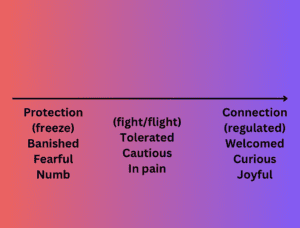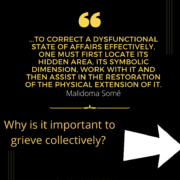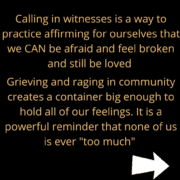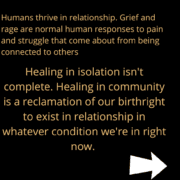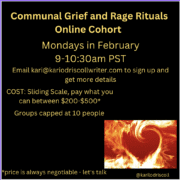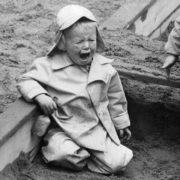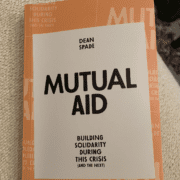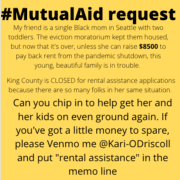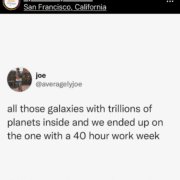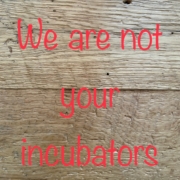
Like so many white folks, I first began hearing about this thing called “mutual aid” during the pandemic lockdown of 2020, when those of us who are lucky enough to be in positions of power and privilege became more and more aware of the fact that the systems and structures around us were failing folks at a rapid rate. Anyway, that might be a whole different post for another day. In the years since, I have witnessed the power of mutual aid to help people and bring communities together and I am, again, astonished at how it’s working today.
If you’re new to the concept, I highly recommend picking up the book Mutual Aid by Dean Spade. It’s a quick read and super powerful. Basically, Dean describes it this way,
Mutual aid is collective coordination to meet each other’s needs, usually from an awareness that the systems we have in place are not going to meet them. These systems, in fact, have often created the crisis, or are making things worse.
And if you can’t quite believe that the systems are making things worse, I’d encourage you to read this post I wrote in 2021, detailing the clusterfuck that was our small, local food bank or engage with the conversation around school loan forgiveness right now that details how some folks have already paid back the amount they owed PLUS more, and because of interest and the way the system is structured, they owe at least double that amount and will likely never be able to pay it off. The systems we created in the name of capitalism have made some folks (and our government) rich rich rich and have firmly placed others in poverty from which they will not be able to emerge in this lifetime. And mutual aid is, in many cases what is keeping those folks alive. That is not hyperbole.
During the pandemic lockdown, if it weren’t for mutual aid, so many of the folks I knew would not have had food.
Read that again. And consider Dean Spade’s three key elements of mutual aid:
- Mutual aid projects must work to meet survival needs and build shared understanding about why people do not have what they need.
- Mutual aid projects mobilize people, expand solidarity, and build movements.
- Mutual aid projects are participatory, solving problems through collective action rather than waiting for saviors.
In my experience, mutual aid is about everyone doing something to contribute. It requires that we believe the folks who tell us what they need without asking for proof, without making them jump through hoops, without pointing them to “funding opportunities” or bureaucracies, since those are the places that have let them fall through the cracks (and, in some cases, literally pushed them through the cracks). It asks us to center the well-being of the community and to know that, in doing so, we are considering the health and well-being of each and every person in that community. It means that we acknowledge that we all have needs and gifts and we can live within a paradigm of ebb and flow, sharing those things with each other without a strict accounting or hierarchy.
I am friends with a young Black single mom who is in a tight spot right now, thanks to the systems and structures around her. The eviction moratorium kept her and her two young children housed during the pandemic lockdown and they have been doing well, until the moratorium ended and her landlord demanded nearly $9,000 in back rent. I don’t know about you, but not many people I know (especially single mothers who live in urban centers) have a spare $9K sitting around. She asked me for my help and, within hours of researching, I discovered that the rental assistance programs in her county and state are all closed to applications because they are so inundated with requests for help.
It could just be me, but it seems that a government who is experiencing a massive influx of requests for assistance should EXPAND their programs to help citizens rather than shutting down and telling folks they’re done helping because there are too many of them. I mean, if government was CREATED for the benefit of the people, then why are they denying those same people the assistance they require in order to LIVE?
But I digress. (Also, I’ll digress again and say that I discovered that applications for LANDLORD assistance are still open, which feels a little – fucked up).
Anyway, it was clear to me that the “normal” avenues weren’t going to work in this case, so I decided to ask my networks for help.

So far, I have managed to raise about a third of what we need to keep this young family housed and it feels pretty damn good. There are a million reasons not to pitch in – you feel like your $25 won’t help “enough,” you wonder where the baby daddy is, you think there *must* be some other way that doesn’t require you to get involved, you don’t know her, you don’t live in Seattle, you haven’t ever been in this situation and you can’t imagine it, you think she should have expected this and saved money, etc. etc.
But there is one compelling reason for you to consider helping if you can.
We belong to each other.
Whether you like it or not. We all belong to each other. And when one of us is safe, we are all a little bit more safe. When one of us feels loved, there is more love for all of us.
I have been so excited and grateful for the folks who have pitched in to help my friend – people who don’t know her, who believe that she needs help and are willing to provide it. As the small donations pile up in my Venmo account, I smile and feel a warm glow in my heart. The more we take care of each other, the better off we all are.
If any of this resonates with you and you can help, please do, and know that this is how we begin to shift things for all of us. The more we act as if we believe we are interconnected, the more we will be. It’s a pretty sweet way to live.
(my Venmo is @Kari-ODriscoll – you’ll know it’s right by the photo of my tattoo that reads “Power Tools” with an image of a heart and a pen)



